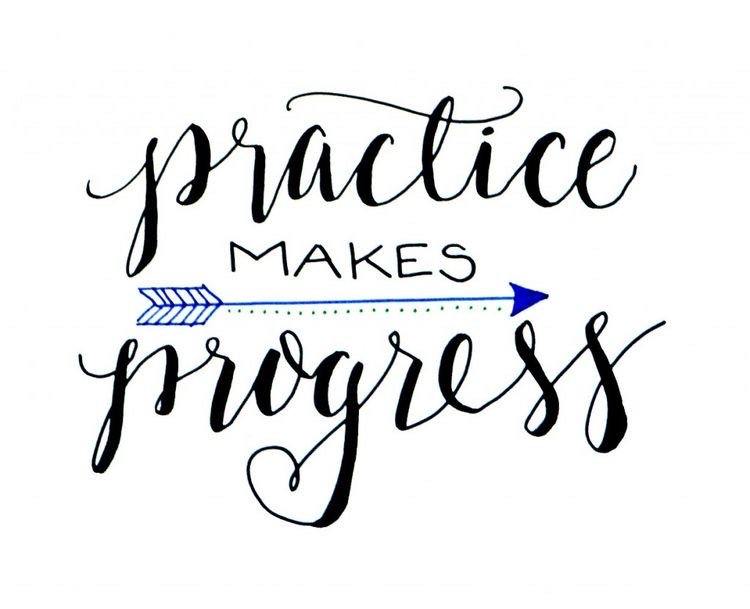Practice Makes Progress

Have you ever wondered why practice is so important? Let’s start with a definition of practice: practice is the act of rehearsing a behavior over and over, or engaging in an activity again and again, for the purpose of improving or mastering it, as in the phrase “practice makes perfect.” But, rather than saying practice makes perfect, what if we said, “practice makes progress?” This takes off the pressure that students have to be perfect every time they play or believing that the first time they play something that it will be perfect. This will help students as they learn new instruments not to be frustrated when they aren’t able to play something perfectly the first time because chances are they will not be able to play something perfectly the first time they play something. It takes minute upon minute, hour upon hour and weeks upon weeks to truly master something.
As a student of a new instrument, the practice becomes an important step in the process, every class we learn a new subject, a new technique, we practice in the class, but our time at home is what make us perfect on that new step, and is what sets us ready to learn something new on our next class. Your teacher will show you as much as they can in class but, the real learning happens at home. Your teacher will assign you things to practice at home to practice and to accomplish before the next lesson. Students who do not practice in between lessons, in essence, will not learn how to play the instrument. It takes rehearsing, learning, and creating a new habit to make performing feel natural.
How long we need to practice in order to see improvement?
If you consider that there’s 7 days in a week, one day is set aside for a lesson day and then, one day will be for rest. So, the other 5 days of the week the student should be practicing. Typically speaking, young children, 4-5, should be practicing about 10 minutes per day. Kinder-2nd graders should extend it to 15 minutes per day while 3rd-5th graders need to put in 20 minutes a day. As the child gets older, 6th-8th graders can increase their focus to 30 minutes a day while even older students in 9th-12th grade should practice 40 minutes a day. Adults that really want to learn can practice even longer and should consider 1 hour per day or more, if time allows.
Tips:
- Always start slow, this will help your muscles to memorize position and notes while giving your brain time to process what you are trying to play. If you play the wrong notes first, it will be twice as hard to go back and correct the muscle memory built. So, there’s no need to rush playing a new piece. It’s always better to play it correctly even at a slower tempo.
- You don’t always have to go back to the beginning of a song. Instead, focus on the fragment that you “always” miss. Practice just that measure (you can also add the measure before and after that one), when you get it correct 3 consecutive time you can move on and try to play the whole song again…stopping and doing the .
- If you can’t play both hands correctly at the same time, do it first with separate hands, then try to put hands together.
- Count every beat on the measure to help you with the rhythm.
The most important thing is to enjoy your practice time, never give up and always remember, practice makes progress!!!
~Ms. Denisse and The My Voice And Piano Team
Categories: piano lessons, piano practice tips, Uncategorized
